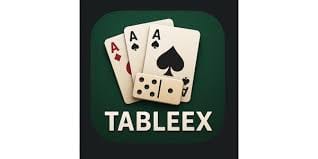TableEx
In a world where gaming often prioritizes stunning visuals, TableEx, a mobile app launched in 2025, redefines inclusivity by bringing classic board and card games to the visually impaired community. Designed specifically for blind and low-vision players, TableEx offers a fully accessible gaming experience through screen reader support, intuitive gesture controls, and a vibrant online community. Available on iOS and Android, this innovative platform transforms how visually impaired players connect, compete, and enjoy timeless games like Dominoes and Snakes and Ladders. This article explores TableEx’s origins, gameplay, features, challenges, and cultural impact, highlighting its role in making gaming truly for everyone.

Origins and Mission
TableEx emerged from a growing need to make gaming accessible to the visually impaired, a group often overlooked by mainstream game developers. Launched in June 2025, the app was developed with input from accessibility advocates and the blind community, ensuring it meets real-world needs. Unlike traditional board games that rely on visual cues, TableEx uses audio feedback and gesture-based navigation to create an intuitive experience. Its mission, as stated on its official site, is to foster connection and fun through inclusive gaming, allowing players to engage solo, with friends, or globally via online multiplayer. The app’s free availability on the App Store and Google Play Store reflects its commitment to accessibility, though in-game currency for creating or joining tables requires purchases or ad-watching.
Gameplay and Available Games
TableEx offers four classic games, each adapted for non-visual play through screen reader compatibility (VoiceOver for iOS, TalkBack for Android) and gesture controls:
- 99: A strategic card game where players add or subtract cards to avoid exceeding a total of 99. It blends luck and tactical decision-making, requiring players to anticipate opponents’ moves.
- Dominoes: Players match numbered tiles to be the first to empty their hand, relying on audio cues to track the board state. Its simplicity makes it a fan favorite.
- Snakes and Ladders: A dice-based game of chance where players navigate a board, climbing ladders or sliding down snakes. Audio descriptions guide movement, ensuring clarity.
- Russian Roulette: A thrilling game of chance where players make bold decisions, with audio feedback signaling outcomes. It’s designed for quick, high-stakes fun.
Each game uses VoiceOver or TalkBack to read board states, card values, or dice rolls, while custom gestures—like swipes or taps—replace visual inputs. Players can join public tables, create private ones, or spectate games in spectator mode, enhancing social engagement. However, some users note that solo play, advertised as a feature, is currently unavailable, a point of contention in community feedback.
Key Features and Accessibility
TableEx’s standout feature is its full accessibility for visually impaired players. Every button is clearly labeled for screen readers, and the interface avoids visual elements, making it intuitive for blind users but less suitable for sighted players. Live voice chat and text chat enable real-time communication, fostering a sense of community during online multiplayer sessions. Players can add friends, invite them to private tables, or join global matches via Wi-Fi, connecting the visually impaired worldwide.
The app’s gesture controls are tailored for ease, allowing players to navigate menus or make moves with simple swipes. Spectator mode lets users observe games without participating, ideal for learning or socializing. However, the reliance on in-game currency for table creation—earned through ads or purchases—has drawn criticism, with some users requesting alternative methods like earning coins via wins, similar to apps like Dice World. Additionally, the app supports multiple languages (Arabic, English, Turkish, Spanish, Vietnamese), with plans for further expansion.
Challenges and Community Feedback
Despite its promise, TableEx faces challenges. Early adopters report bugs, such as crashes on iOS 18 and account creation errors, though these are not game-breaking. Some players have encountered language issues, like screen readers reading Arabic letters despite English settings, suggesting localization glitches. The absence of solo play, despite being advertised, frustrates users who prefer offline practice. Community discussions on forums like audiogames.net highlight these issues, with players urging developers to add bot opponents and improve testing before releases.
The ad-based currency system also sparks debate. While ads fund server costs, some players dislike watching them to earn coins and find the purchase process cumbersome, lacking straightforward payment options. Privacy concerns are minimal, as TableEx does not store private or game room messages, prioritizing user security. Developers are responsive, promising updates like new games and reward systems, but players emphasize the need for robust beta testing to ensure stability.
Educational and Social Impact
TableEx offers more than entertainment; it promotes cognitive skills and social connection. Games like 99 enhance strategic thinking and mental math, while Dominoes and Snakes and Ladders teach pattern recognition and probability. Russian Roulette encourages risk assessment, making it appealing for players who enjoy high-stakes decisions. These games provide a fun way to develop problem-solving skills, particularly for younger players or those in therapeutic settings.
Socially, TableEx builds bridges within the visually impaired community. Its online multiplayer and chat features create a virtual game night, combating isolation often faced by blind individuals. The app’s presence on platforms like AppleVis and blindgamers.net has fostered a growing community where players share strategies, report bugs, and advocate for improvements. Educators and parents value TableEx as a screen-based yet accessible activity that promotes inclusive play without requiring physical boards or sighted assistance.
Cultural Significance and Future Potential
TableEx has quickly become a cultural touchstone for accessible gaming. Its release aligns with a broader push for inclusivity in technology, resonating with advocacy groups and blind gamers. Posts on X and forums highlight its potential to expand, with users requesting games like Chess or Checkers to diversify the library. The app’s success could inspire other developers to prioritize accessibility, setting a standard for inclusive design.
Looking ahead, TableEx plans to add more games and languages, addressing bugs and enhancing features like solo play or alternative currency systems. Its commitment to community feedback positions it as a leader in accessible gaming, with the potential to grow beyond its current offerings. As it evolves, TableEx could redefine how the visually impaired engage with digital entertainment.

Conclusion
TableEx is a groundbreaking step临2⁊ step forward in accessible gaming, bringing board and card games to the visually impaired with screen reader support and gesture controls. Despite early challenges like bugs and limited solo play, its online multiplayer, chat features, and inclusive design foster connection and fun. By empowering blind players to enjoy classics like Dominoes and Snakes and Ladders, TableEx redefines gaming as a universal joy. As it continues to grow, this innovative app promises to create lasting memories and a vibrant community for the visually impaired, proving that gaming is truly for everyone.
